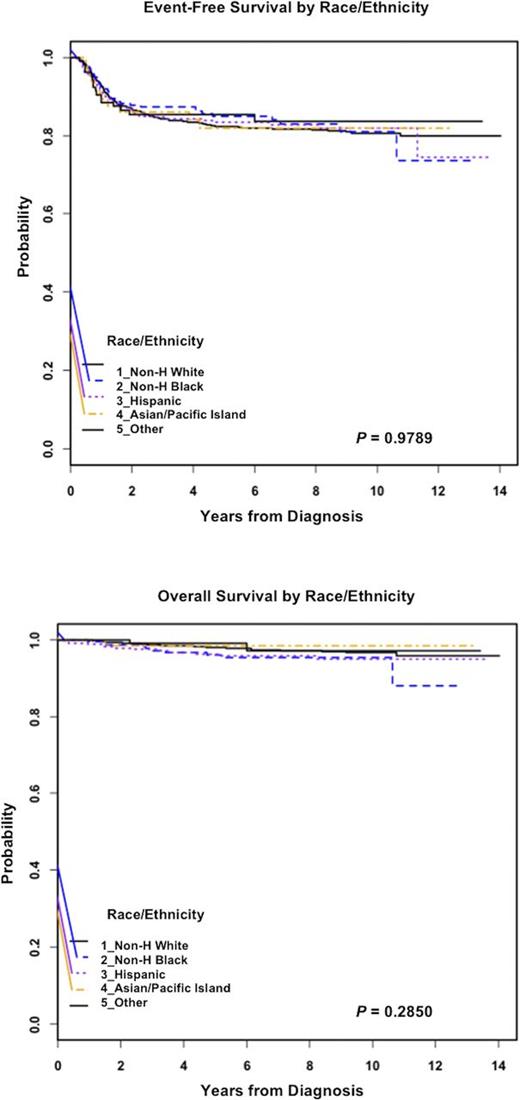Abstract
Introduction:
While survival in Hodgkin Lymphoma (HL) is excellent, disparities by race/ethnicity have been described. Population-based and single center studies of children and adolescents with HL suggest that those who are black or Hispanic (vs. non-Hispanic white) have worse outcomes (Grubb Pediatr Blood Cancer 2016; Metzger JCO 2008). Whether race/ethnicity is predictive of survival in children and adolescents with HL after adjusting for clinical features and treatment-related variables is unknown. Our objective was to examine whether race/ethnicity was predictive of event-free survival (EFS), relapse, and overall survival (OS) in patients enrolled on contemporary Children's Oncology Group (COG) trials with response-based therapy for treatment of newly diagnosed HL.
Methods:
We conducted a pooled analysis of individual level data in children and adolescents enrolled on 3 consecutive Phase III clinical trials for treatment of intermediate, low and high-risk HL (AHOD0031, AHOD0431, AHOD0831). Five-year EFS and OS were compared across racial/ethnic groups and were estimated using the Kaplan-Meier method. Cumulative incidence of relapse was similarly constructed with K-sample tests. Cox regression models were constructed to examine the influence of race/ethnicity on EFS and OS, and were adjusted for age, sex, insurance status, histology, Ann Arbor stage, B symptoms, bulk disease, COG study, and radiation therapy (RT).
Results:
Between 2002 and 2012, 2155 patients 1-21 years of age enrolled on 3 COG trials, 2071 (96%) of whom were included in this analysis. Patients treated outside the US and Canada (n=84) were excluded. The distribution of race/ethnicity as reported to COG by treating institutions was: 64% non-Hispanic white (N=1334), 11% non-Hispanic black (N=236), 16% Hispanic (N=329), 3% Asian/Pacific Islander (N=66), and 5% other (N=106). Compared to other groups, more non-Hispanic white patients had private (vs. government) insurance (p<0.0001). The cohort was 53% male (N=1090) and a mean of 14.6 (±3.5) years at enrollment, with 46% (N=950) <15 years of age. Whilestage III/IV disease was more prevalent in black and Hispanic patients (p=0.0002), there was no difference in B-symptoms (p=0.19) or bulk (p=0.88) by race/ethnicity. Nodular sclerosing histology was more prevalent among non-Hispanic whites (p<0.0001). There was no difference in receipt of RT by race/ethnicity (p=0.53).
Survival: In pooled analysis, with a median follow-up of 6.9 years, 5-year EFS was 83%, OS was 97%, and neither outcome differed by race/ethnicity (EFS: p=0.98; OS: p=0.29). Cumulative incidence of relapse was 16.8% and did not differ by race/ethnicity (p=0.93). In the multivariable model for EFS, there was no significant effect of race/ethnicity (p=0.95). Similarly, race/ethnicity was not significant in the multivariable model for OS (p=0.14). Finally, race/ethnicity was not significantly associated with EFS or OS in multivariable models by individual study, accounting for risk group.
Conclusion:
We observed no difference in survival by race/ethnicity among children and adolescents treated for HL with contemporary, risk adapted response-based therapy on COG Phase III trials. This suggests that the survival gap observed in population-based studies is largely reduced by access to clinical trials and by receipt of comparable therapy between cohorts. In light of this, it can be hypothesized that inequities in access to high-quality care, rather than differences in individual disease biology may underlie racial disparities observed in the community oncology setting. To examine whether response-based paradigms mitigated biologic differences between groups, further analyses will explore early response to treatment by race/ethnicity. Further analyses will also examine treatment-related toxicities and second malignant neoplasms by race/ethnicity, as well as the independent contribution of socioeconomic status to outcomes.
No relevant conflicts of interest to declare.
Author notes
Asterisk with author names denotes non-ASH members.


This feature is available to Subscribers Only
Sign In or Create an Account Close Modal